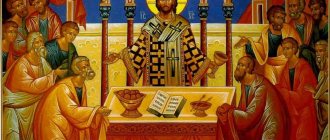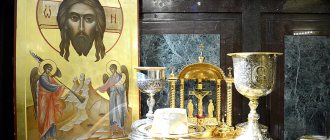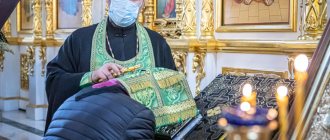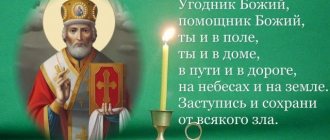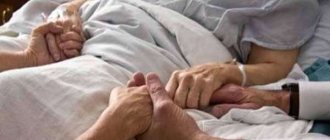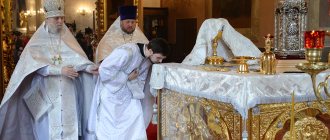Prayers of Thanksgiving after Communion
The sacrament is performed after the evening liturgy. Before visiting him, they go to confession to get permission from the priest to receive Communion. After the sacrament in the temple, you need to express your respect to God by reading the prayer text.
Returning home, the person continues to read thanksgiving to the Lord. Usually the rest of the evening is devoted to this. They pronounce the words in a calm atmosphere in front of the images of saints. People learn texts by heart, this allows them to concentrate better on them.
The meaning of the Sacrament
Communion in Christianity is the Sacrament of the consecration of unleavened bread and wine for use during a church service. In churches it occupies the main part of the service. The sacrament makes it possible to draw closer to God and join Him.
One cannot understand the words of Christ about blood and flesh consumed as food in the literal sense of these words - to eat. After all, He said this while alive. We must understand this: Jesus Christ united with the products, becoming one with them, and we must eat them consciously, understanding that this is a particle of God that will be in us, while our souls seem to join eternal life in the Kingdom of Heaven.
During communion, conditions are created for the unity of the nature of the Creator with His creation. This unity existed before eating the forbidden fruit. The Eucharist is an attempt to find ourselves again in the once lost paradise. It is advisable for every Christian to receive communion more often in order to join the Divine, accept eternal life and be saved - this is the highest goal of the sacrament.
How many prayers of thanksgiving after Communion
The first prayer of thanks to God after Communion is said in the church after the completion of the sacrament. Believers continue further reading on their own. The ritual consists of 5 texts:
- Holy Mother of God;
- Symeon Metaphrastus;
- Saint Basil the Blessed;
- Gratitude;
- Short fourth.
It is customary to read the Thanksgiving Letter first. It is aimed at expressing gratitude to the Lord for spiritual healing. Next comes an appeal to St. Basil the Blessed.
Then follow an appeal to Simeon Metaphrastus, a short fourth, which have a special meaning. They express a petition for eternal life, mercy at the Last Judgment.
At the end, an appeal to the Most Holy Theotokos is read. At the end of the cycle, do not forget about the obligatory kontakia and troparia. It is worth remembering your Guardian Angel and saying a canon to him.
Login to the site
Nika Kravchuk
Content:
|
How to behave before Holy Communion? Is it possible to brush your teeth and take medicine in the morning? What should you not do after the Eucharist? Should I continue to fast? Why shouldn't you bow to the ground? Is it allowed to kiss icons? Is there a ban on foods with seeds? Read the answers to the questions in the article.
The sacrament that connects man with God
Communion (Eucharist) is the central Sacrament of the Church. Thanks to him, a person can already unite with Christ on earth. After all, when we approach the cup, we eat not bread and wine, but the Body and Blood of Christ, thus accepting the Savior into our hearts.
And this is not some symbolic action, but reality. So that people are not literally afraid when they see Flesh and Blood in the chalice, the Lord vouchsafes us to partake of the Holy Gifts under the guise of bread and wine. But in the history of Christianity you can find many cases when those who approached the cup with doubts were horrified at some point. They saw the bloody liquid with their own eyes and even felt the taste of flesh in their mouths. Anyone can familiarize themselves with such examples in Christian literature; many cases are described in the book of Archpriest Vyacheslav Tulupov “The Miracle of Holy Communion.”
But we would like to draw the reader’s attention to a slightly different topic - how to behave on the day of Communion - and talk about some myths.
We have already written about preparation for the Eucharist in the article “Communion for the first time - how to prepare?” Here you can learn in detail how to fast, what prayer rules to read and generally how to behave the day before.
How to behave in the morning before the Sacrament of the Eucharist?
On the day of Communion, you should not just “subtract” the morning rule and “finish reading” the sequence. First of all, it is worth praying carefully so that the Lord will vouchsafe us to receive communion. We are all unworthy of the Body and Blood of the Savior, so we must gratefully accept this life-giving gift.
Should I brush my teeth?
The question is often asked: is it possible to brush your teeth in the morning? Some “orthodox” believe that it is impossible. But many priests answer: it is possible. Why?
If it is unpleasant for a person to go to work or communicate with people because of the unpleasant smell from his breath, then how can he approach the Chalice in this form and with such a feeling? We must come to Christ with a pure heart and clean lips. In all senses.
Communion and taking medications
Another problematic question: how to take communion if you have to take pills in the morning?
Bishop Mark Golovkov says that the pills are not food, but medicine. If you have serious health problems and it is dangerous for you to interrupt the course of some drug, then you should not refuse both the pills and Holy Communion.
If you take some vitamins or nutritional supplements, and nothing serious will happen when you take them not in the morning, but in the afternoon, then why panic? You can calmly take communion, and when you get home, take vitamins or medications.
If everything is more or less clear with behavior before Communion, then many questions remain with what is possible and not possible after receiving the Holy Gifts.
What is possible and what is not allowed after Holy Communion?
Should I bow to the ground? Is it possible to spit? Is it possible to kiss on this day? Should you brush your teeth in the evening? These questions will seem funny to many, but nevertheless, they often worry participants.
You can't sin
If you ask a priest what you cannot do after Communion, he will probably answer in one word: “Sin.” Why? Because you have accepted Christ into your heart. And God is sinless. It cannot be combined with sin. Therefore, if we begin to break the commandments, then we literally drive the Savior out of our hearts.
That is why after the Sacrament of the Eucharist it is advised to be especially careful so as not to lose the received grace. It is believed that one should talk a little, pray more, thank God, and, if possible, avoid empty talk and company. After all, if the demon cannot tempt us directly, then he will try to do it through family and friends or even random people.
Always give thanks
If a person does something kind or pleasant to us, we just want to thank him. But how can we thank the Lord, who for the sake of our salvation accepted death on the cross and gave us the opportunity to unite with him in the Sacrament of the Eucharist? No earthly words will suffice. But this does not mean at all that you should not try.
After Communion, you should carefully read the prayers of gratitude, and also express gratitude in your own words. The main thing is sincerity and faith.
To bow or not to bow?
It is believed that on the day of Holy Communion one should not bow to the ground. Why?
Kneeling is a sign of repentance, crying for sins. And the person receiving communion rejoices, and does not cry or mourn. He accepted Christ into his heart.
Should I continue to fast?
Some confessors bless their spiritual children to abstain from fast food and wine throughout the day. It is worth saying that there are no such regulations. Where did this custom come from then?
After Holy Communion it is very easy to dissipate grace. And a hearty meal can contribute to this. You had a good lunch, then you wanted to sleep. Thoughts about prayer and the meaning of the Sacrament faded into the background. This is why some priests do not bless eating heavy fatty foods and drinking wine.
But a moderate meal, even if it contains meat, dairy products and wine, will not harm. So the main emphasis in this matter is moderation.
Is it possible to spit and eat berries with seeds?
Surely you have heard from believers or even priests that after the Sacrament of the Eucharist you cannot spit out anything. How to understand this and is it worth adhering to this rule?
This prohibition is associated with pious fear, so as not to accidentally spit out a piece of the Holy Gifts. But in order to minimize this risk, after Communion we always take a drink - holy water or diluted wine and pieces of prosphora.
Moreover: during Holy Communion it is advised to swallow the piece completely without chewing it. Then you won’t be afraid that I might accidentally spit out a particle along with food while brushing your teeth in the evening.
Some priests still, to be on the safe side, advise not to eat certain foods that will cause us to “spit”: fish with bones, berries with seeds, and so on. If you had to use them, they are often advised to carefully collect the seeds and burn them.
In general, the opinions of priests on this issue differ: some say that there is a point in such actions, while others call not to strain out the mosquito.
What should you do? Either consult the priest you are confessing to, act according to your conscience, or avoid possible situations altogether. It is not necessary to eat foods with seeds on the day of Holy Communion.
Is it possible to brush your teeth, kiss icons and relatives?
If you received Communion by swallowing a piece without chewing, then you hardly need to worry that you will accidentally clean out a piece of the Holy Gifts. If any concerns remain, then perhaps you should refrain from evening dental care.
And the last question from this category: is it possible to venerate icons and kiss relatives?
The ban on kissing crosses and icons looks like a manifestation of excessive piety. After the Sacrament of the Eucharist, you can and should venerate holy objects.
There are no specific prohibitions on kissing relatives or marital kisses. But the person receiving communion should, if possible, refrain from sensory experiences and devote more time to prayer. In general, this is purely individual.
The duration of fasting depends on the frequency of communion
Kramskoy’s painting “Christ in the Desert” illustrates the testimony of the Gospel about the 40-day fast of Jesus Christ before His public preaching.
In the time of Christ, fasting meant complete abstinence from food and water. Photo: radiovera.ru Three days of fasting before receiving the Holy Mysteries are appropriate if a Christian does not often partake of the Flesh and Blood of the Son of God and does not observe all fasts. The number of days of abstinence is reduced depending on the frequency of communion.
Thus, if a Christian sincerely wishes to receive communion every Sunday liturgy (and this is a fair desire), the confessors bless a one-day fast on the eve of the liturgy. This rule is valid if a Christian observes all church fasts.
In general, the question of what a particular Christian can eat before Communion, especially in difficult cases, simply needs to be resolved during a face-to-face conversation with the priest.
Fasting is not fasting, but one of the ways to have a beneficial effect on the soul.
Without prayer and repentance, fasting is, at best, a diet. Reasonable abstinence, established with the advice of a confessor, will strengthen the health of body and soul.
The experience of the holy fathers about abstinence in food is confirmed by modern doctors. For example, eat food in small portions more often, do not eat a lot of meat and fatty foods, eat more vegetables and grains.
Remembering that the Flesh and Blood of Christ is the most priceless and highest treasure on Earth, it is not difficult to endure any fast.
How often can you take communion?
Participation in the Divine Liturgy and Communion of the Holy Mysteries is the apogee and triumph in the spiritual life of a Christian.
Photo: old.donskoi.org Modern pastors welcome the desire of parishioners to partake of the Flesh and Blood of Christ as often as possible.
Today's world is rapidly becoming Satanic, which is not surprising among Christians, but remains completely unnoticed by non-Christians. Under these conditions, weekly communion seems more than appropriate.
A Christian who has personally experienced the pricelessness of this holy Gift of God to man does not need to prove the benefits of such practice. The rest can only recall the words of Christ:
“Truly, truly, I say to you, unless you eat the flesh of the Son of man and drink his blood, you have no life in you. He who eats My Flesh and drinks My Blood has eternal life, and I will raise him up at the last day.”
(John 6:48-54)
By leaving a comment, you accept the user agreement
Who is allowed to take communion?
Christian commandments are a gift from the church to all people, and not a heavy burden. Thanks to them, they become humble and patient. In the Church, priests are called to distribute this gift of the Divine Liturgy to all Christians who would like to get closer to this grace, which has a strong effect on soul and body.
But there are cases when a clergyman can, and sometimes is obliged to, impose penance, and under special conditions, excommunicate him from communion for a long time, which is done for the sake of a person’s spiritual rebirth.
The main reason for excommunication is grave sin (fornication, murder, theft, witchcraft, renunciation of Christ, outright heresy). Previously, people lived in communities and excommunication for particularly serious sins could last up to twenty years. But people who sinned came to church together with everyone else and prayed all these years for forgiveness.
In the modern world, when everyone is divided, this would mean leaving a person completely without God. Nowadays, a repentant person can be excommunicated from communion for several months, having to read prayers. This is done so that the devil cannot lead the repentant away from the faith. After all, the priest does not punish, but helps prepare for the secret rite. By making incredible efforts to change for the better, a person receives worthy communion.
Parishioners whose moral state is simply incompatible with this ritual are deprived of communion - these are people in a civil marriage, which is considered fornication, as well as those who harbor a grudge and do not want to forgive a repentant person.
They may not admit a person who was not present at the evening service, since the liturgical day begins in the evening, or those who were poorly prepared for communion, or for some other reason.
You can’t make a decision here on your own; you have to confess. After all, only through repentance can a priest understand the severity of sins, a person’s moral state, and his life situations. And only the priest, at his own discretion, can allow confession or prohibit for some time, or impose penance for a certain period. And the solution will be different in each specific case.
How to take communion correctly?
An Orthodox Christian who has been baptized by a priest and who must accept the Holy Scriptures has the right to receive communion in the Church.
For the correct communion, a person must prepare well in advance. He is obliged to fast for several days, read prayers for Holy Communion and confess.
Fasting means not eating animal meat, dairy products, eggs, and sometimes fish. We must give up all types of entertainment, including marital intimacy, and refrain from anger and swearing. Devote your time to studying church literature, the Gospel, going to Church and reading prayers at home.
It is mandatory to read prayers in the morning and evening, including special texts, before the sacrament. The canons can be read several days in advance, and the Consequence is read before communion.
Without repentance, communion is unacceptable. Sin is anything that goes against the decisions of God. The Lord gave the commandments as an expression of His will. When preparing for confession, it is advisable to remember the parable of the Last Judgment and Jesus' Sermon on the Mount. We must remember all the serious and minor sins that were not forgiven earlier, but for those going for the first time - starting from the age of seven. By asking for forgiveness for yourself, forgive everyone who has offended you.
The Church recommends that laity confess every month. This allows you to consciously relate to the world around you and to be in the Christian faith.
